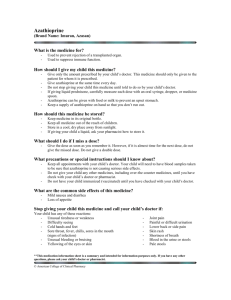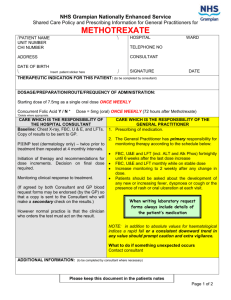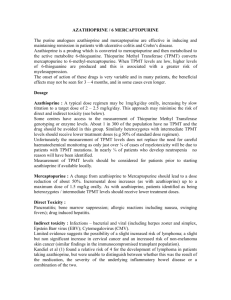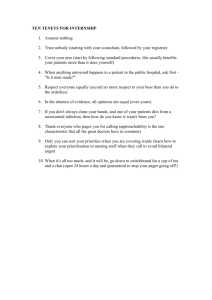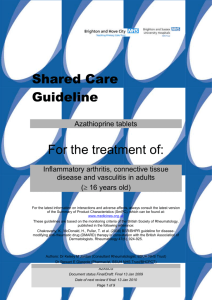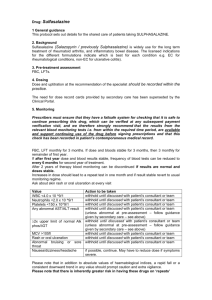FINAL-Azathioprine-mercaptopurine-gastro
advertisement
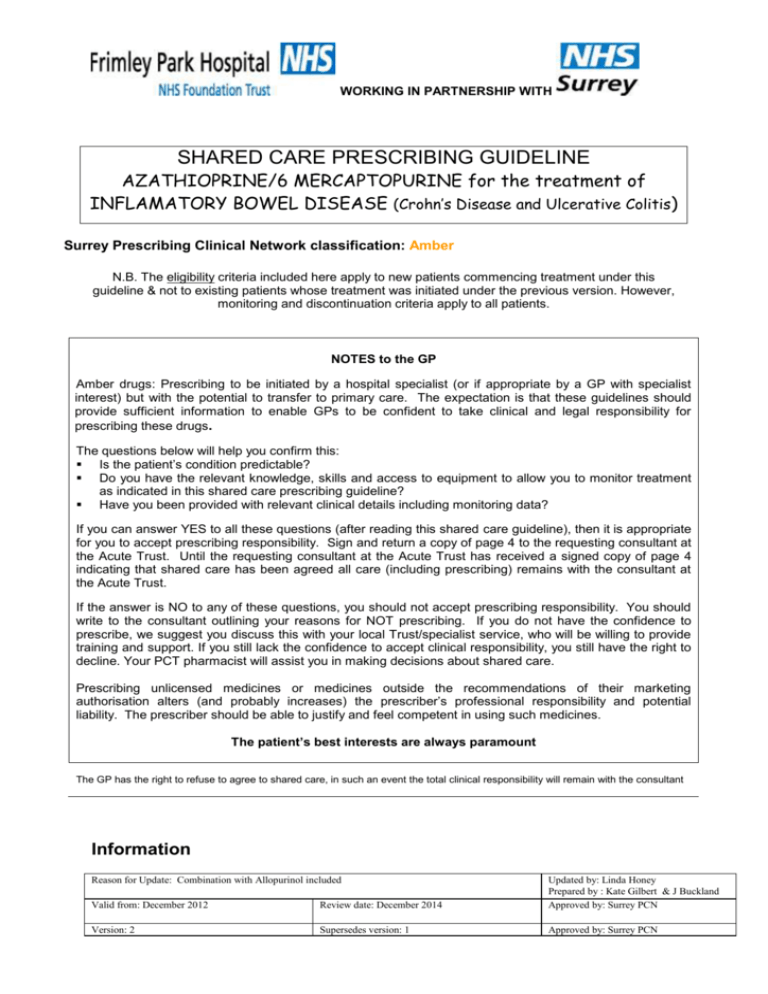
WORKING IN PARTNERSHIP WITH SHARED CARE PRESCRIBING GUIDELINE AZATHIOPRINE/6 MERCAPTOPURINE for the treatment of INFLAMATORY BOWEL DISEASE (Crohn’s Disease and Ulcerative Colitis) Surrey Prescribing Clinical Network classification: Amber N.B. The eligibility criteria included here apply to new patients commencing treatment under this guideline & not to existing patients whose treatment was initiated under the previous version. However, monitoring and discontinuation criteria apply to all patients. NOTES to the GP Amber drugs: Prescribing to be initiated by a hospital specialist (or if appropriate by a GP with specialist interest) but with the potential to transfer to primary care. The expectation is that these guidelines should provide sufficient information to enable GPs to be confident to take clinical and legal responsibility for prescribing these drugs. The questions below will help you confirm this: Is the patient’s condition predictable? Do you have the relevant knowledge, skills and access to equipment to allow you to monitor treatment as indicated in this shared care prescribing guideline? Have you been provided with relevant clinical details including monitoring data? If you can answer YES to all these questions (after reading this shared care guideline), then it is appropriate for you to accept prescribing responsibility. Sign and return a copy of page 4 to the requesting consultant at the Acute Trust. Until the requesting consultant at the Acute Trust has received a signed copy of page 4 indicating that shared care has been agreed all care (including prescribing) remains with the consultant at the Acute Trust. If the answer is NO to any of these questions, you should not accept prescribing responsibility. You should write to the consultant outlining your reasons for NOT prescribing. If you do not have the confidence to prescribe, we suggest you discuss this with your local Trust/specialist service, who will be willing to provide training and support. If you still lack the confidence to accept clinical responsibility, you still have the right to decline. Your PCT pharmacist will assist you in making decisions about shared care. Prescribing unlicensed medicines or medicines outside the recommendations of their marketing authorisation alters (and probably increases) the prescriber’s professional responsibility and potential liability. The prescriber should be able to justify and feel competent in using such medicines. The patient’s best interests are always paramount The GP has the right to refuse to agree to shared care, in such an event the total clinical responsibility will remain with the consultant Information Reason for Update: Combination with Allopurinol included Valid from: December 2012 Review date: December 2014 Updated by: Linda Honey Prepared by : Kate Gilbert & J Buckland Approved by: Surrey PCN Version: 2 Supersedes version: 1 Approved by: Surrey PCN WORKING IN PARTNERSHIP WITH Azathioprine is an immuno-modulator that is used to induce and maintain remission in Ulcerative Colitis and Crohn’s Disease. Azathioprine is a pro-drug, which is cleaved rapidly in the liver to 6mercaptopurine. Although unlicensed to treat these indications, these immune-modulators use is widely established in Inflammatory Bowel Disease (see BNF Section 1.5). The main toxic effect is myelosuppression, although hepatotoxicity is also well recognised. 6-mercaptopurine is used as steroid-sparing agents in both Ulcerative Colitis and Crohn’s disease and the British Society of Gastroenterology guidelines state it should be considered as a treatment option for patients who: • require two or more courses of corticosteroid treatment within one year • suffer a disease relapse as the dose of prednisolone is reduced • suffer a disease relapse within six weeks of stopping prednisolone • require postoperative Azathioprine is metabolised to 6-mercaptopurine and subsequently to numerous 6-thioguanine nucleotides. The exact mode of action of these metabolites is still unknown, although it is thought to be multifactorial, including purine antimetabolite action, inhibition of several pathways in nucleic acid biosynthesis (preventing proliferation of cells involved in the immune response) and damage to DNA through the incorporation of thiopurine analogues. This information sheet does not replace the SPC, which should be read in conjunction with this guidance. Prescribers should also refer to the appropriate paragraph in the current edition of the BNF. Link to the relevant SPC website: www.medicines.org.uk Dose Azathioprine Normal daily dose of 2-2.5mg/kg or less if TPMT (thiopurine methyltransaminase) is low. In some individuals nausea may be a problem upon initiating therapy and one may consider starting at a lower dose of 50mg. The dose should then be gradually increased in 50mg increments every 2 weeks to 2 – 2.5 mg/kg daily, if tolerated. 6-Mercaptopurine Normal daily dose of 1-1.5mg/kg daily or less if TPMT (thiopurine methyltransaminase) is low. The initial oral dose is 50mg once daily for 1 week, and then gradually increased in 25mg increments every week to 1-1.5mg/kg daily, if tolerated. Clinical response can usually be expected in 6-12 weeks Azathioprine / 6-Mercaptopurine in combination with allopurinol Allopurinol has a clinically significant interaction with azathioprine / 6-MP that can lead to increased toxicity however this combination may be recommended by the hospital specialist in IBD patients particularly in those who are unable to tolerate to or do not respond to treatment with azathioprine / 6MP. The use of azathioprine / 6-MP in combination with allopurinol will increase the possibility of patients tolerating / responding to immunomodulator therapy. If combination therapy is recommended with allopurinol the dose of azathioprine / 6-MP MUST be reduced to 25-33% of standard dose (or TPMT adjusted dose). Due to the complexity of administering low dose 6-MP it should be reserved for patients that have already trialled azathioprine (6-MP is a cytotoxic drug and this reduced dose regimen may involve splitting a scored tablet). Cautions Patients should try to avoid contact with people who have active chickenpox or shingles and should report any such contact to their GP or hospital specialist. Careful assessment of risk versus benefit should be carried out before use during pregnancy and breast-feeding. The British Society of Gastroenterologists suggests that azathioprine / 6-MP can be continued throughout pregnancy; there is no increase in the rate of miscarriage, congenital abnormality or infection in those treated with these drugs (true for either parent). Breastfeeding is not usually advised. Contraindications Moderate/severe renal or liver impairment Significant haematological impairment Thiopurine methyltransferase (TPMT) deficiency Hypersensitivity to Azathioprine/6-MP Side effects 2 WORKING IN PARTNERSHIP WITH The most common side effects (affecting approximately 20% of patients) are flu-like symptoms (myalgia, headache, diarrhoea) which characteristically occur 2-3 weeks after initiating treatment and usually subside if treatment is continued. Gastro-intestinal disturbances - Nausea, vomiting, diarrhoea, anorexia and abdominal discomfort Hepatotoxicity (hepatic necrosis, biliary stasis) Bone marrow suppression (leucopoenia, thrombocytopenia) and therefore increased risk of infection. Most likely to occur in the first few weeks of treatment. Oral ulceration, rarely gastrointestinal ulceration Hypersensitivity reactions (fever, rigors, rash, myalgia, arthralgia, hypotension, dizziness) Rarely pancreatitis, interstitial nephritis Alopecia At the beginning of treatment the patient should be advised to report any signs of bone marrow suppression (i.e. infection, fever, unexplained bruising or bleeding) to the IBD nurse. This should then be reported to the hospital specialist and GP. Interactions Allopurinol has a clinically significant interaction with azathioprine / 6-MP that can lead to increased toxicity. Avoid prescribing of allopurinol with azathioprine / 6-MP without a significant dose reduction. NOTE this combination may be recommended by the hospital specialist in IBD patients particularly in those who are unable to tolerate to or do not respond to treatment with azathioprine / 6-MP. Increased risk of haematological toxicity with co-trimoxazole/trimethoprim. Patients should avoid ‘live’ vaccines such as oral polio, oral typhoid, MMR, BCG and yellow fever, whilst on immunosuppressive therapy. Contact hospital specialist for advice on any vaccinations if required. Anticoagulant effect of warfarin possibly reduced by Azathioprine/6-MP. Possible increased risk of leucopenia when azathioprine/6-MP given with aminosalicylates. 3 WORKING IN PARTNERSHIP WITH RESPONSIBILITIES and ROLES Specialist responsibilities 1 2 3 4 5 6 7 8 9 Initiate treatment and prescribe until the GP formally agrees to share care (as a minimum supply the first month of treatment or until patient is stabilised). Carry out baseline and subsequent monitoring until the GP agrees to share care and patient is stabilised. Send a letter to the GP requesting shared care for the patient. Routine clinic follow-up on a regular basis. Send a letter to the GP after each clinic attendance ensuring current dose, most recent blood results and frequency of monitoring are stated. Evaluation of any reported adverse effects by GP or patient. Advise GP on review, duration or discontinuation of treatment where necessary. Inform GP of patients who do not attend clinic appointments. Ensure that backup advice is available at all times General Practitioner responsibilities 1 2 3 4 5 Monitor patient’s overall health and well being. Prescribe the drug treatment as described Report any adverse events to the hospital specialist, where appropriate Monitor blood results (FBC, U&E’s, LFT’s & CRP) in line with recommendations below Help in monitoring the progression of disease. Monitoring requirements and actions Pre-treatment FBC, U&Es, LFT’s, CRP, TPMT and Varicella status If patients heterozygote for TPMT, monitoring should continue at monthly intervals Subsequent Monitoring LFT's & FBC - Every week for 4 weeks then fortnightly for 1 month then monthly for 2 months, then if stable 3 monthly thereafter. CRP - 3 monthly to assess response to treatment. U&E's - Every 6 months (more frequently if there is any reason to suspect deteriorating renal function). FBC LFTs Lymphocytes < 0.5 x 109/L Neutrophils < 2.0 x 109/L < 1.5 x 109/L Platelets < 150 x 109/L > 2 fold rise in AST, ALT (from upper limit of reference range) > 4 fold rise in AST, ALT Discuss with IBD nurse or Consultant/Registrar Discuss with IBD nurse or Consultant/Registrar Stop treatment and contact IBD nurse or Consultant/Registrar Discuss with IBD nurse or Consultant/Registrar Discuss with IBD nurse or Consultant/Registrar Stop treatment and contact IBD nurse or Consultant/Registrar immediately. Symptoms and actions Rash (significant new) Severe or persistent infections, fever, chill Abnormal bruising or bleeding Varicella Nausea Stop azathioprine/6-MP and check FBC If FBC abnormal contact IBD nurse or Consultant/Registrar Wait until rash resolved and consider restarting at reduced dose, providing no blood dyscrasias Stop azathioprine/6-MP Check FBC and contact IBD nurse or Consultant/Registrar Do not restart until results of FBC known Stop azathioprine/6-MP until recovery and check FBC Do not restart if blood test abnormal Contact IBD nurse or Consultant/Registrar If in contact with the virus, contact Consultant/Registrar or IBD nurse Advise patient to divide dosage and take with food If no improvement, reduce dosage or stop Contact IBD nurse or Consultant/Registrar if reducing dose ineffective Patient's / Carer’s role 1 2 3 Ask the specialist or GP for information, if he or she does not have a clear understanding of the treatment. Tell the specialist or GP of any other medication being taken, including over-the-counter products. Read the patient information leaflet included with your medication and report any side effects or concerns you have to the specialist or GP 4 WORKING IN PARTNERSHIP WITH BACK-UP ADVICE AND SUPPORT Contact details Specialist Specialist: Dr Langlands 01276 604 080 Col Connor 01276 604 514 Dr Direkze 01276 526 614 01276 526 614 01276 526 953 or IBD Nurse: Kate Gilbert Medicines Information Email address: 01276 604 514 Dr Ala Dr Berry Hospital Pharmacy: Telephone No. Kate.gilbert@fph-tr.nhs.uk 01276 604604 x Bleep 606 01276 604 744 Medicines.information@fphtr.nhs.uk 5 WORKING IN PARTNERSHIP WITH SHARED CARE PRESCRIBING GUIDELINE AZATHIOPRINE/6 MERCAPTOPURINE for the treatment of INFLAMATORY BOWEL DISEASE Agreement for transfer of prescribing to GP Patient details / addressograph: Name…………………………………….. Address………………………………….. ………………………………….. ………………………………….. DOB………………. Hospital No………………………………. NHS No………………………………. Drug name and dose: Is azathioprine / 6-MP being given in combination with allopurinol: YES / NO If yes the dose of AZA/ 6-MP has been reduced to 25-33% of standard dose: YES / Not applicable The following tests, investigations have been carried out: Date initiated:…………………………………. At the last patient review the drug appeared to be effectively controlling symptoms/ providing benefit: Yes / No The patients has now been stabilised on a dose of: ………………………………………….. I will arrange to review this patient regularly. Date of next clinic appointment:…………………………… Consultant: Address: Contact Number Agreement to shared care, to be signed by GP and Consultant. Consultant Signature: ……………………………………………….. Date: GP: Address: GP Signature: Contact Number ………………………………………………… Date: Main Carer: Contact Number: IBD Nurse Specialist: Contact Number: 01276 604604 x bleep 606 If shared care is agreed and GP has signed above please return a copy of this page to the requesting consultant or alternatively fax to: Acute Trust please insert appropriate Fax Number: 6
